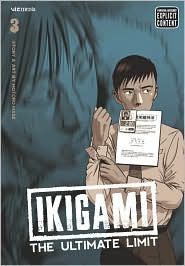Today I take a look at the latest releases of two Viz Signature titles -- Dogs: Bullets & Carnage and Ikigami: The Ultimate Limit.
Dogs: Bullets & Carnage, by Shirow Miwa, volume 2. The post-human world of Dogs is seductively compelling in its violence and its inhabitants are touched by both madness and an irreverent attitude toward pretty much everything and everyone. In this volume, troubled swordswoman Naoto tags along with "dogs for hire" Heine and Badou in order to try to find out who "stole her past." Naoto's sad history -- her very body is a manifestation of the violence that permeates the title -- brings a sense of melancholy and emotional weight to this volume. Heine and Badou, on the other hand, have formed a partnership that is rather hilarious in its dysfunctional-functionality. Badou's approach to his "job" is quite simply insane and on occasion he lightens the mood of the book considerably.
Naoto's quest for answers about her past adds some desperately needed structure to Miwa''s storytelling. There are hints of a larger narrative structure to the title when we get glimpses of shadowy individuals who are clearly manipulating events from behind the scenes. As a whole, though, it is often easier to not question where the plot is going and go with the flow, even if the flow takes you through beautifully choreographed fights that seem rather purposeless in the grand scheme of things.
As always, the stark black and white art is the absolute star of the show. Miwa is capable of capturing my attention even when I feel slightly befuddled about why exactly folks are fighting each other to the death.
Ikigami: The Ultimate Limit, by Motoro Mase, volume 3. This volume contains case studies of two young men who receive notice from the government that they are going to die in 24 hours. While first study focuses on one of the darker outcomes of the "National Welfare Act," the other offers the possibility of redemption in knowledge of the criminally wasteful loss of one's own life. Both of the young men who receive their death note from government worker Fujimoto have yet to have really accomplished a single thing up until this point. Their reactions to their notices offer a thoughtful psychological study of the very human variables that give individuals not merely a reason to "live" but a reason to endure the circumstances of their lives.
The title continues to hint at possibilities of revolt from within the system through the slow awakening of the deliverer of these official death notes, Fujimoto. Co-workers assume that Fujimoto has "made peace" with his part in the dirty business of sacrificing citizens to some imagined notion of social order, but there are hints that his placid exterior will eventually be stripped away by his prolonged contact with these dead men and women walking. I'm still waiting for real dissent to worm its way into system but the title continues to hold my attention and I have a rather dark fascination with the case studies that "end badly." Although not every story in this book is always a "tragedy" in the strictest sense, every story remains entertaining and disturbing at its core.
Review copies provided by Viz.



